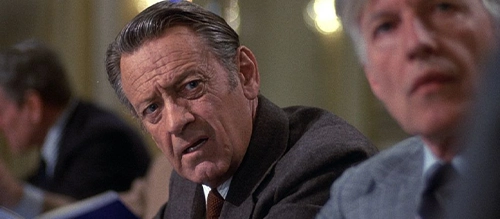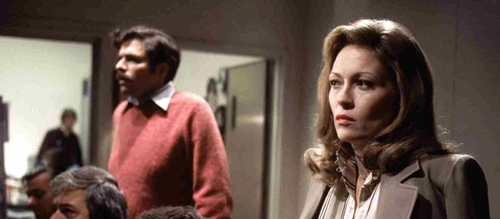Network (1976) Review

Network (1976)
Director: Sidney Lumet
Screenwriters: Paddy Chayefsky
Starring: Faye Dunaway, William Holden, Peter Finch, Robert Duvall, Ned Beatty
Some quotes go down in history as being oddly prescient. Perhaps there are none more so than the most famous line of Peter Finch’s Howard Beale in Network, his final role (winning posthumously both the Oscar and BAFTA for Best Actor). One can’t help but marvel at him, dripping wet in a grey trench coat, wringing his hands at the television cameras and pleading for viewers to run to the windows, stick their heads out, and scream as loud as they can, “I’m as mad as hell, and I’m not going to take it anymore!” Beale’s turn as a modern-day ‘prophet’ for the people is part of UBS network’s scheme to save their falling ratings; taking this worn-out news anchor who threatened to shoot himself live on television, shouting and swearing and raving, into the hit they desperately need, is a sight to behold. Now the Howard Beale Show is what’s keeping the company going, through all the in-fighting and power-plays and detachments from absolute reality that go on inside the glass tower of a multi-billion-dollar company, and the film follows them all with morbid curiosity and biting satire.
Paddy Chayefsky’s inspired, cutting screenplay (for which he also won the Oscar, becoming the only person to win three solo screenwriting Academy Awards), is blackly comic, consistently aware of outside politics and influences (such as the Arab oil boycott of the 70s, which plays into the film’s plot), and of growing audience savviness to the disconnectedness of the corporate billionaires who run our lives. Perhaps one of the interesting points is that he criticises anyone in power, not just those on one side of the political spectrum, which is often the case. Barbs are aimed at left-wing organisations using millions of dollars for screentime in a capitalist regime they’re attempting to overthrow, using the system they’re meant to be against; the leaders of these organisations laughed at by the script as they squabble over how much money it’s going to cost on one slot or another, as much as the capitalist moguls puppeteering the thoughts behind the country’s citizens, no matter the monetary or moral cost. Monty Python would do similarly in a film like Life of Brian, mocking the impossibly large amount of left-wing activist organisations who are all exactly the same and do nothing very much very well, as well as the stupidity of the Roman rulers.
This corruption isn’t simply through the unethical use of money and power, which are, as Ned Beatty’s CCA chairman Arthur Jensen describes in a wonderfully shot rant to Beale, “primal forces of nature.” Lumet places Beatty at the far end of a conference table, the camera at the other end, all the lights leading to him in controlled lines of focus, very far away from us, small in the frame, to show just how far away from reality he has become. Here he preaches of the reality of business; “There is no America. There is no democracy.” Through this speech, along with many other moments in the writing, both explicit and playfully slipped into the dialogue, we see a kind of predictor of Baudrillardian notion of illusion and reality, hyperreality (as he would coin in his 1981 text, “Simulacra and Simulation”), where the world is so preoccupied with television re-presenting information that is false, with no referent to reality, re-presenting a re-presentation of an idea, that people have begun to see this unreal world presented to them as the truth, the real, the hyperreal. We have lost our way with truth.

Faye Dunaway’s Oscar-winning portrayal of Diana Christensen is one of these people, so plugged into the system of ratings and numbers and wealth and screentime that she will exploit any means she can to get what is needed. She bills footage of extravagant seers, bank robberies, and anything she can to boost the numbers of her recently-helmed Howard Beale show. With this constantly in mind, her way of navigating her life, her fling with William Holden’s Max Schumacher, former exec at UBS, never remains stable. How can it, when that suggests a cosy reality far removed from her business life, which crosses over into her personal world? Once outside the system, Schumacher can see Christensen for what she really is. “You’re one of Howard’s humanoids… like everything you and the institution of television touches. …You’re television incarnate, Diana.” She thinks only in terms of fiction, her relationships like scripts and screenplays she can choose to axe if she doesn’t like the quality of the writing and the cliched, predictable nature of the oncoming ending. It won’t get the good ratings.
When the end finally arrives, nobody is punished. Bad things happen, the world doesn’t wrap up neatly. Good guys don’t always win, and bad guys don’t always lose. The script doesn’t go the way we as consumers are used to. In these final moments, Elliot Lawrence’s score vanishes. The world is stark and uncinematic in that sense. Reality has no soundtrack, nothing to cue us into how we should feel.
But television can do this. The ‘tube’ can help. To end the film, Lumet flicks back to a similar setup to the opening shot of the film; four television screens on different stations broadcasting different collections of shows. Don’t like one reality? You can always change over. Even the news is showbusiness. “Television is not the truth. Television is an amusement park,” so they say in the film. There is an irony in this, as that prophet of the postmodern, Jean Baudrillard, five years later famously discussed Disneyland as the model of a perfect suburban reality of happiness and dreams, a perfect example of the hyperreal. Disneyland, like the amusement park of television media, is more real than reality.
No wonder Beale’s character, labelled as mad and raving, wanted people to scream out of the windows. He’s the only one able to see truth, and allowed to preach it, to a certain extent. But even he must be cut short. The people wouldn’t survive in the real world. And so the Network makes sure to keep the populace happy, as they want it, as they tune in for it. What is most insightful about Network is therefore not that corporations show propaganda as news. Not that they’re in control the whole time. Not that they run everything. It is that they only survive as long as people tune in and give them that power, and Network shows that, for the most part, we’re all too happy to do so. It truly was a film way ahead of its time.
Score: 22/24

